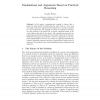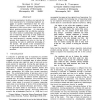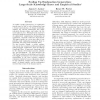193
click to vote
EXACT
2009
14 years 12 months ago
2009
In this paper a representative example is chosen that is meant be fairly simple for illustrating the point that in a very common kind of instance, argument and explanation are mixe...
113
click to vote
EUSFLAT
2009
14 years 12 months ago
2009
Abstract: We consider application of Zadeh's impossibility principle and extended logic FLe to approximate scientific explanation from the standpoint of the philosophy of scie...
112
click to vote
IAT
2010
IEEE
15 years 1 days ago
2010
IEEE
It is widely acknowledged that providing explanations is an important capability of intelligent systems. Explanation capabilities are useful, for example, in scenario-based traini...
109
click to vote
IJMMS
2002
15 years 1 months ago
2002
Relations between mental and physical aspects of an agent can be of various types. Sensing and acting are among the more commonly modelled types. In agent modelling approaches ofte...
129
click to vote
AIR
2005
15 years 2 months ago
2005
Abstract. We present an overview of different theories of explanation from the philosophy and cognitive science communities. Based on these theories, as well as models of explanati...
108
click to vote
KI
2008
Springer
15 years 2 months ago
2008
Springer
ed from context by seeing an explanation inferentially, much in the same way that early expert systems saw an explanation as chaining of inferences. This approach omitted, for the ...
120
click to vote
IJCAI
1989
15 years 3 months ago
1989
Existing explanation facilities are typically far more appropriate for knowledge engineers engaged in system maintenance than for endusers of the system. This is because the expla...
117
click to vote
AAAI
1990
15 years 3 months ago
1990
Explanation requires a dialogue. Users must be allowed to ask questions about previously given explanations. However, building an interface that allows users to ask follow-up ques...
118
click to vote
AAAI
1996
15 years 3 months ago
1996
To explain complex phenomena, an explanation system must be able to select information from a formal representation of domain knowledge, organize the selected information into mul...
116
click to vote
UAI
2008
15 years 3 months ago
2008
Bayesian networks can be used to extract explanations about the observed state of a subset of variables. In this paper, we explicate the desiderata of an explanation and confront ...







